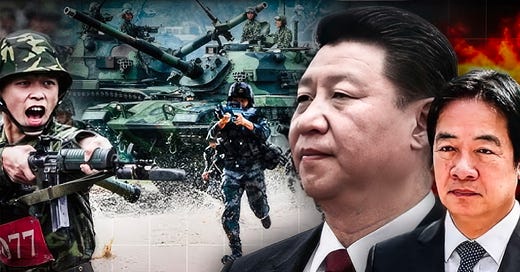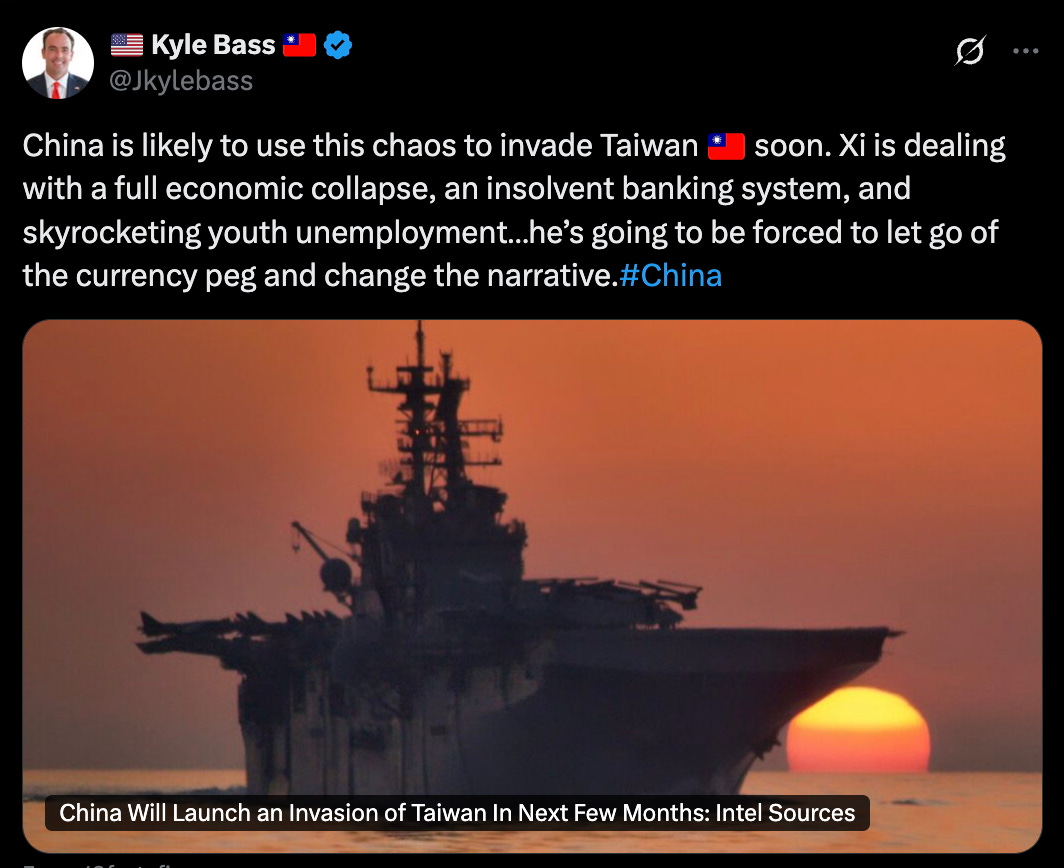The calculus of war often hides behind the fog of peacetime wishful thinking. But when a regime faces the collapse of its internal order, the temptation to seek salvation through external aggression becomes not merely probable, but perilously rational. China’s present condition, as Kyle Bass argues, is precisely such a moment. A regime on the brink, with few options left but one: war. Specifically, a war to seize Taiwan.
At first glance, this might appear alarmist. After all, isn’t the People’s Republic of China deeply intertwined with global markets? Wouldn’t an invasion risk sanctions, conflict with the United States, and economic ruin? Possibly. But Bass and defense analyst Reuben F. Johnson compel us to ask the more urgent question: would not invading Taiwan present an even greater risk to the regime?
Consider the facts: China’s banking system is effectively insolvent, propped up by bad debt and political pressure. Its real estate sector—formerly the engine of growth—has imploded, leaving unfinished towers and bankrupt developers as symbols of economic hubris. Youth unemployment is not just high, but incalculable; so massaged are official statistics that they have simply stopped reporting it. Worse still, the yuan teeters on the edge of devaluation, held aloft only by unsustainable intervention. When the peg goes, capital flight will follow—and so will any remaining illusion of stability.
To this economic tinderbox, add political desperation. Xi Jinping has positioned himself as a second Mao: infallible, eternal, the embodiment of Party and State. Yet unlike Mao, Xi presides not over a revolutionary crescendo, but over an exhausted, cynical population. His purges have left him isolated. His zero-COVID policy shattered public confidence. His surveillance state is extensive but brittle—designed more to monitor dissent than to command loyalty. The social contract of rising prosperity in exchange for political quiescence is broken.
In such conditions, the doctrine of political survival dictates distraction. History offers no shortage of precedents. Argentina, 1982. Russia, 2022. When regimes cannot solve domestic dysfunction, they export crisis. Xi’s Taiwan fixation is not merely ideological; it is increasingly existential. Reclaiming Taiwan would offer a rallying cry to distract from internal decay, reassert Chinese nationalism, and reframe Xi as a triumphant unifier rather than an incompetent autocrat.
Johnson’s report in 19FortyFive emphasizes the military posture already in play. The PLA’s constant incursions into Taiwan’s Air Defense Identification Zone (ADIZ) are not haphazard. They are rehearsals. China is waging a "grey zone" campaign of subversion, probing Taiwan’s defenses and resolve while avoiding outright war. But the transition from grey to red may come faster than Washington believes. As Admiral Samuel Paparo of U.S. Indo-Pacific Command has warned, these are not symbolic maneuvers; they are dry runs.
Further, Johnson cites Sir Alex Younger, former head of the UK’s Secret Intelligence Service, who describes China's posture as a "textbook" of subversion—political, cyber, and psychological. This is not theoretical. It is kinetic, tactical, and strategic. The signs are visible. What is lacking is the political will in the West to connect them.
That brings us to the uncomfortable truth: Beijing perceives the United States as distracted, divided, and disinclined to intervene. The disorganized withdrawal from Afghanistan, the prevarication over Ukraine, and the political dysfunction in Washington have not gone unnoticed in Zhongnanhai. The CCP leadership sees an open window, one that will not stay open long. Trump has only just returned to office. The Pentagon is still recalibrating. Congressional Democrats remain fixated on domestic crusades. Now is the moment of perceived weakness.
Bass suggests that Xi must soon abandon the currency peg. When that happens, and it is a matter of when, not if, the Chinese economy will unravel in earnest. In that moment, Xi will need a narrative shift of colossal proportions. Taiwan offers precisely that. And unlike in past decades, Beijing may now believe it can win.
Three possible invasion scenarios loom. First, a slow, suffocating blockade, strangling Taiwan’s economy and forcing surrender without a shot. Second, a blitzkrieg of missile strikes and airborne landings aimed at decapitation before a coherent response is possible. Third—the doomsday variant—a coordinated attack on U.S. regional bases and infrastructure, possibly even a homeland strike executed via proxies or asymmetric cyberwarfare. Chuck DeVore rightly notes that the third option, while high-risk, is not unthinkable for a regime that sees itself cornered.
One might object: doesn’t China risk catastrophic failure? Certainly. But desperation distorts judgment. When the cost of doing nothing outweighs the risk of defeat, even rational actors may choose irrational gambles. Xi may calculate that America, beset by internal divisions and global fatigue, will flinch. If so, deterrence fails.
That is why Trump’s new administration must act now. Not react. Prepare. Signal.
First, bolster deterrence in the Indo-Pacific. Fast-track arms shipments to Taiwan. Embed U.S. advisors. Deploy naval assets visibly and in force. Deterrence is not established by tweets or policy papers; it is established by capacity and will. Both must be demonstrated.
Second, accelerate intelligence coordination with allies. Japan, Australia, India, each has stakes in preventing a Chinese regional hegemony. Intelligence fusion centers, joint exercises, and shared surveillance are not luxuries. They are prerequisites.
Third, prepare the American public. War over Taiwan is not inevitable, but it is plausible. The days of assuming peace by default are over. A clear, calm, but firm presidential address could articulate what is at stake: sovereignty, freedom, deterrence, and the credibility of American commitments.
Finally, strike at the economic assumptions driving Xi’s calculus. If China believes a war over Taiwan will be absorbed economically, it must be disabused. Expand export controls. Coordinate financial sanctions in advance. Deny China access to semiconductors, rare earths, and key inputs. Economic war may forestall kinetic war.
Let us not delude ourselves: Taiwan is not merely a dot on the map. It is the hinge of Indo-Pacific freedom. Its fall would not only embolden China, but signal the twilight of American deterrence. If Xi invades and wins, the 21st century will not belong to freedom. It will belong to the surveillance state, the slave camp, the Politburo.
We still have time. But not much.
The hour demands clarity, courage, and resolve. If we fail to act now, we will be forced to act later, in worse conditions, with higher costs, and fewer allies. Kyle Bass is right: the storm is gathering. The Trump administration must prepare the levees.
Before the flood arrives.
If you don't already please follow @amuse on 𝕏.






